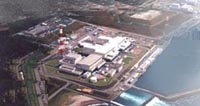Official defends speed in alerting about radioactive water leak at nuke plant in Japan

The speed with which the public was notified about damage at a quake-hit nuclear plant that resulted in a radioactive water leak was defended by a senior Japanese power company official.
Tokyo Electric Power Co., or TEPCO, has come under fire for being slow to inform the public about damage at the Kashiwazaki-Kariwa plant, which has been shuttered since the July 16 magnitude-6.8 earthquake.
In one incident, radioactive water sloshed out of a tank and was flushed out to sea. In another, radioactive material was vented into the air.
Plant officials said they had not foreseen such a powerful quake hitting the facility, and repeatedly underreported its impact afterward, though TEPCO and nuclear regulators have stressed the amounts of radioactivity leaked were extremely low and posed no threat to the environment or local residents.
Still, the damage raised concerns, prompting the government to order it closed indefinitely until its safety can be confirmed.
Speaking to reporters Wednesday, TEPCO Chief Nuclear Officer Ichiro Takekuro said the company regretted the delay in reporting the damage and apologized again for the worries it engendered.
But, regarding the water leak, Takekuro - who is also the company's executive vice president - said there were difficulties in relaying information at the plant the day the quake occurred, and noted that much time was required to find the spill and determine whether it was radioactive.
"I believe the workers at the power plant made the maximum effort to get the information out given the timeframe they had to work with," said Takekuro, who served as the plant's site manager from 2001-2004.
He said, however, that TEPCO also needs to review the process down the road to see how it can be improved to get information out in a more timely fashion to the local community.
Visual inspections of the ailing power plant have been completed, and TEPCO now plans to bring in an expert-led team for a more detailed equipment inspection as well as evaluate its seismic safety, he said. The company also plans to conduct detailed studies of the nearby offshore fault line on which the quake occurred, he said.
Plant repairs are not likely to begin before the arrival of investigators from the U.N.'s International Atomic Energy Agency, who are expected to inspect the plant in the next few weeks, he added.
"In those weeks, I don't think we'll be in any position to do repair work. We will probably be doing more detailed investigations of the current situation, or preparing for them," he said.
Given that inspections are still under way, TEPCO has yet to estimate what the total cost of damage will be or how it will impact its bottom line, Takekuro added.
Subscribe to Pravda.Ru Telegram channel, Facebook, RSS!


